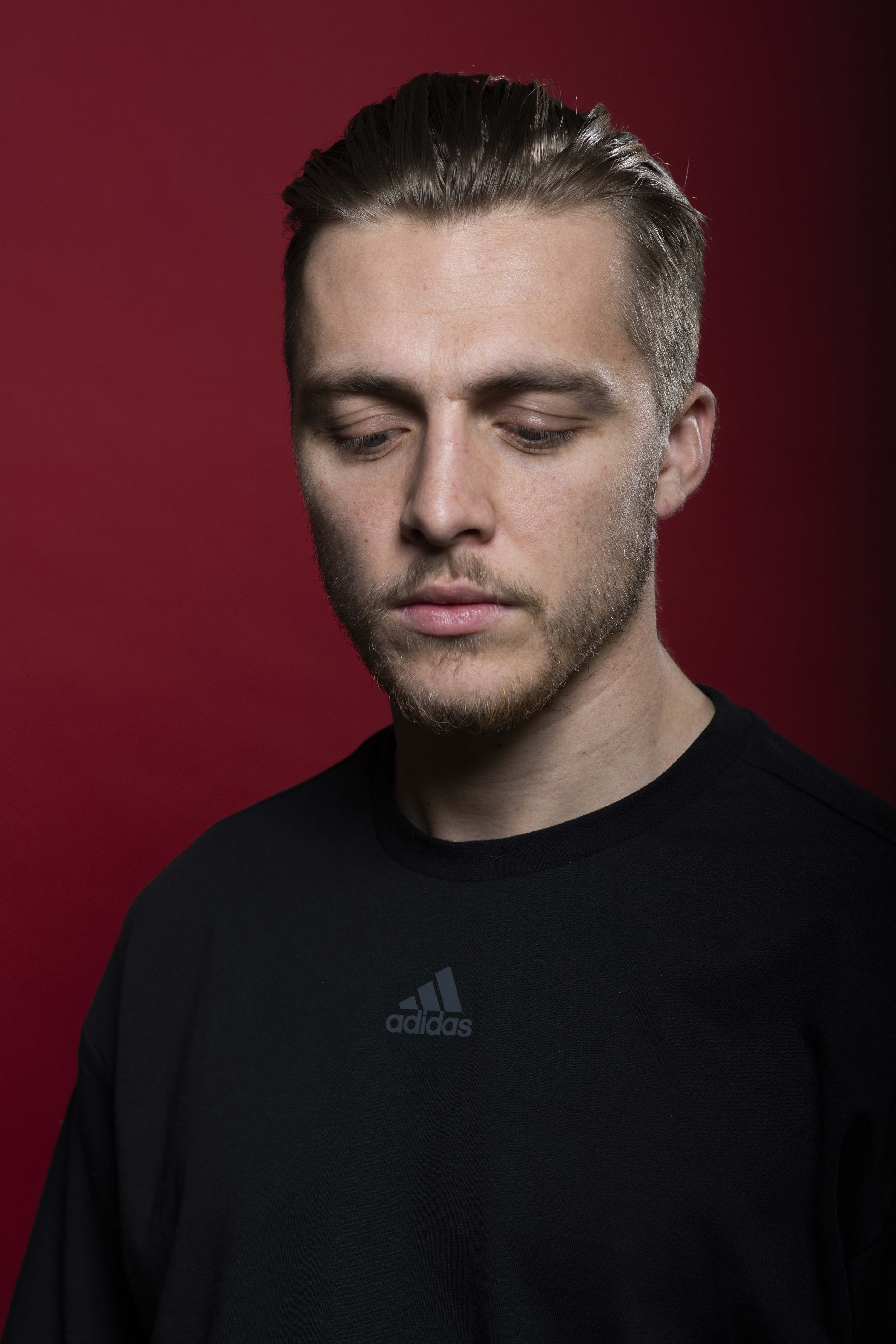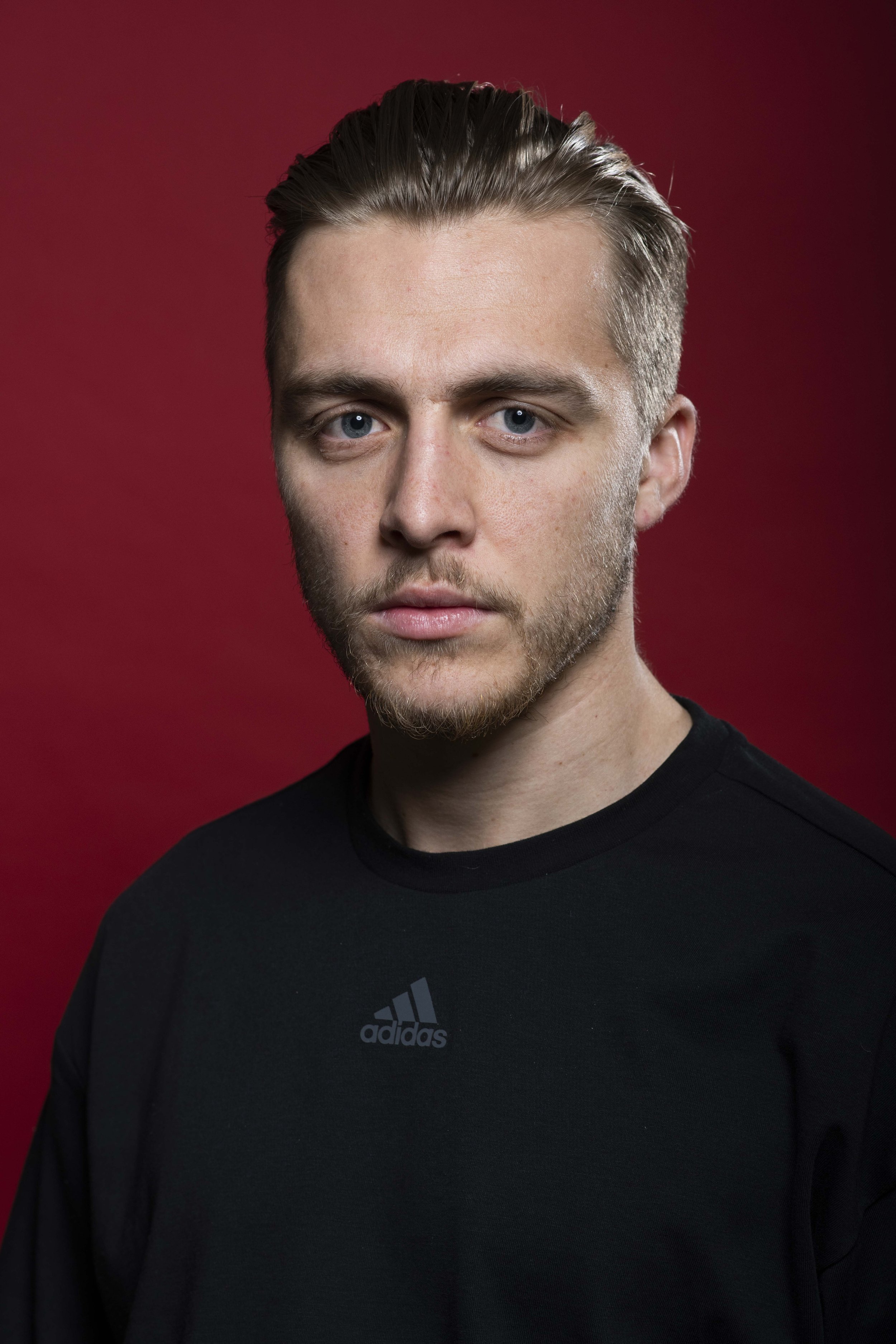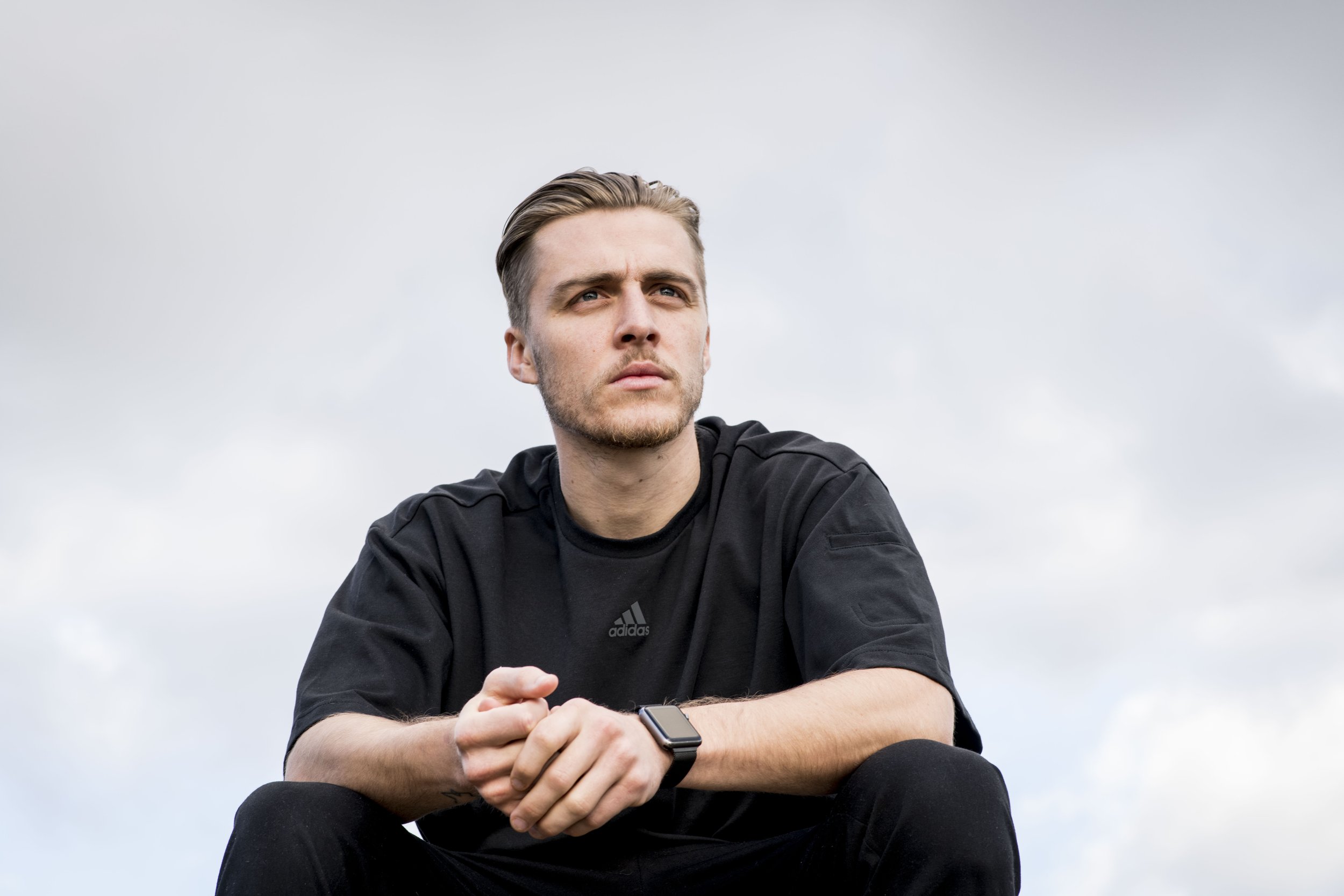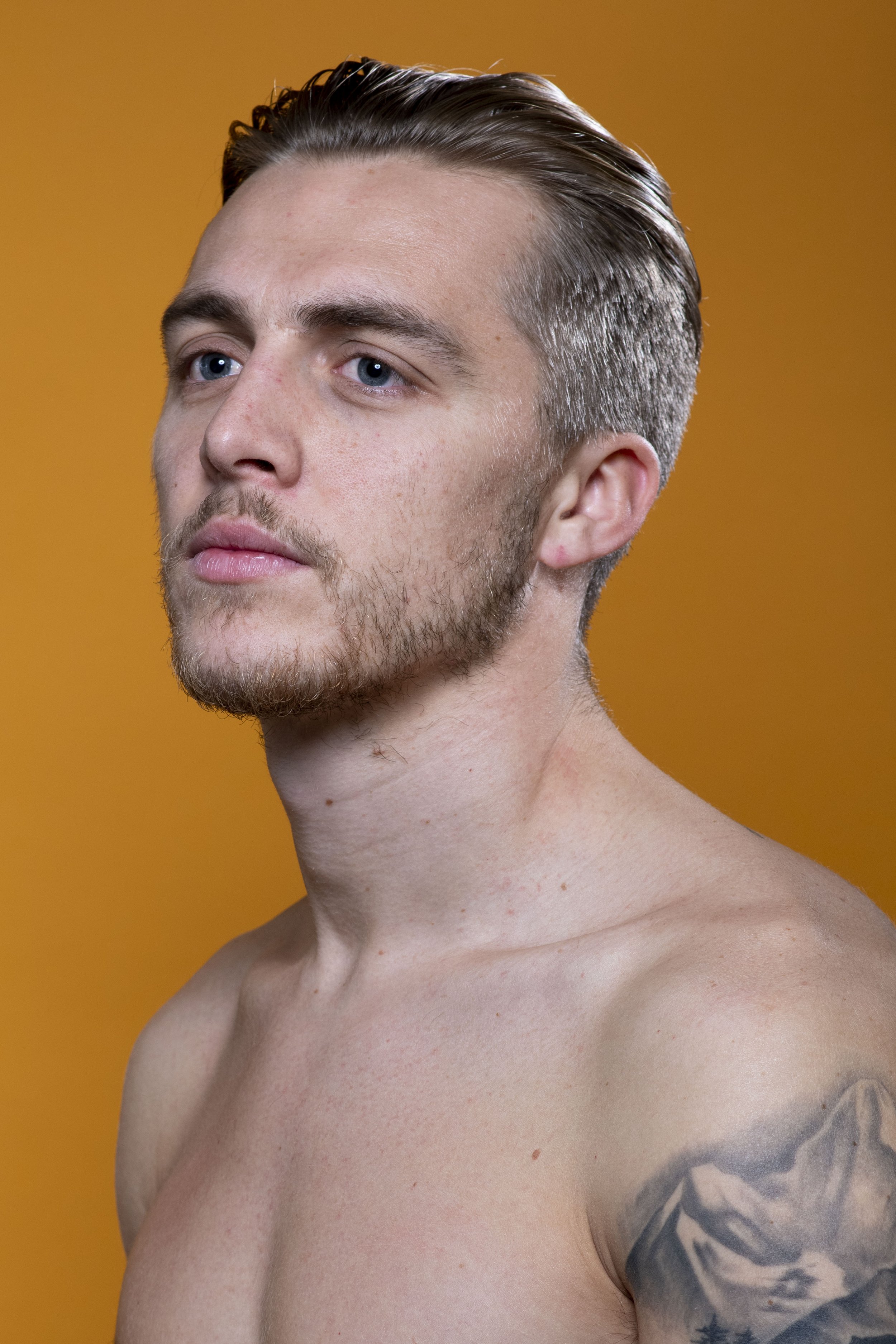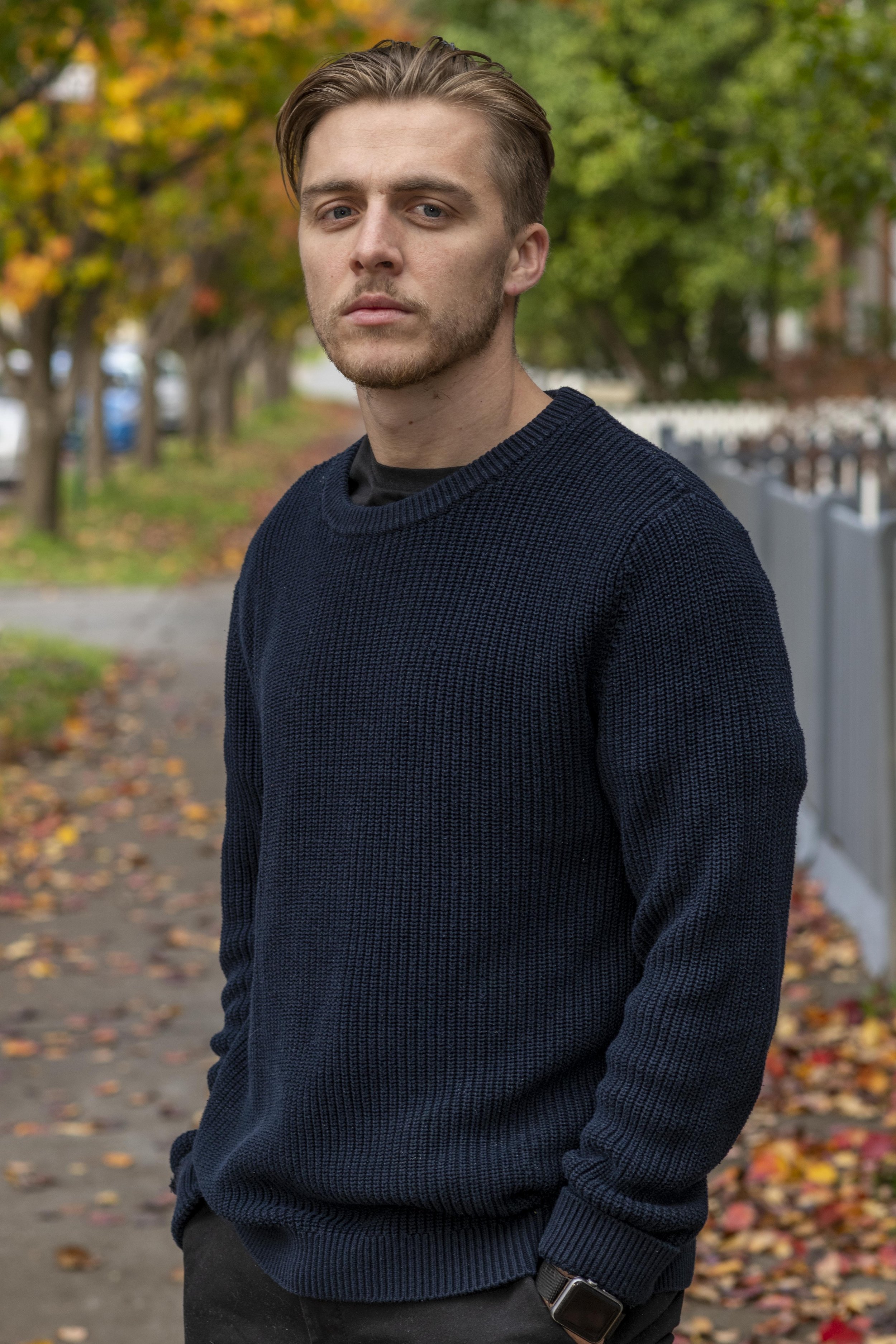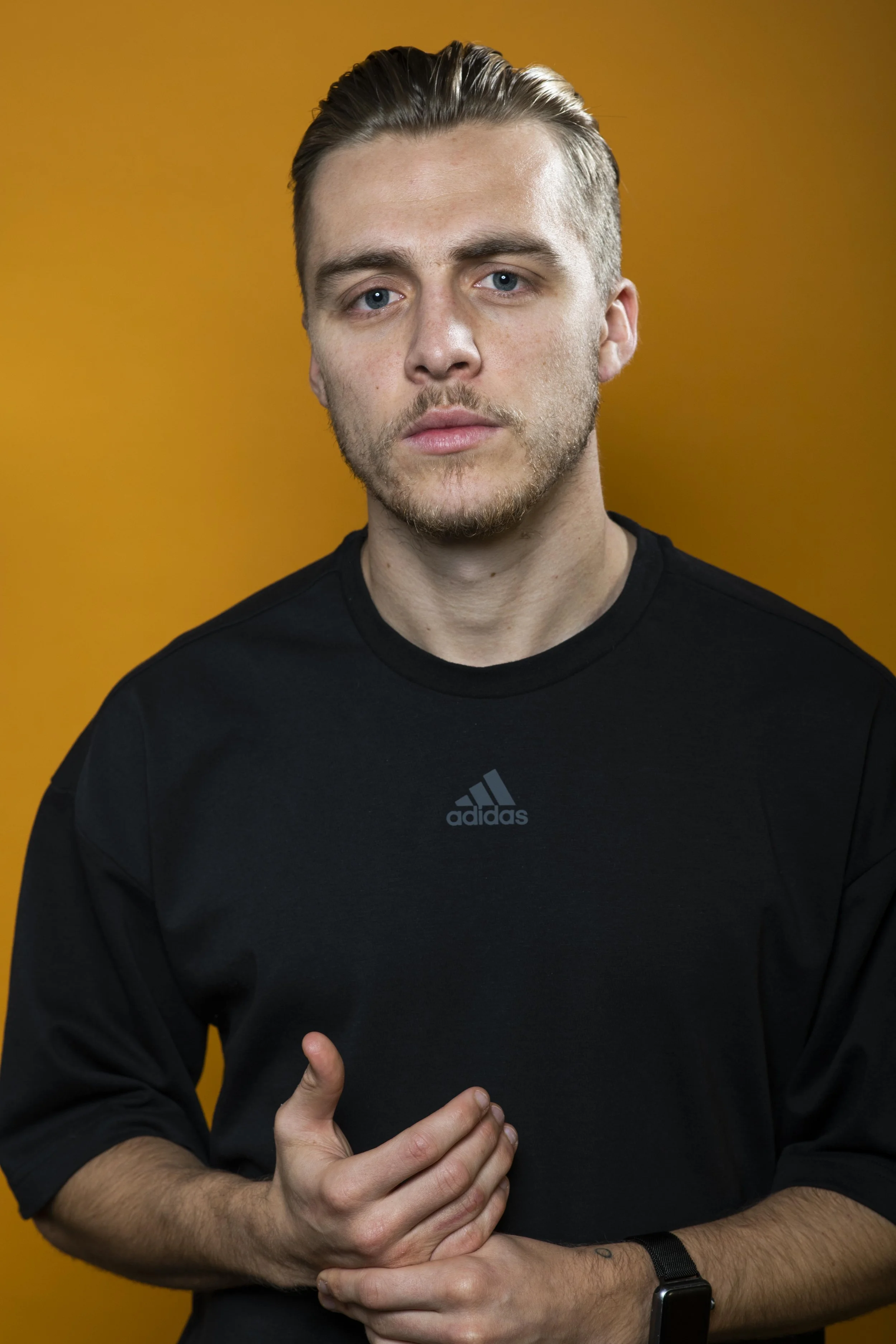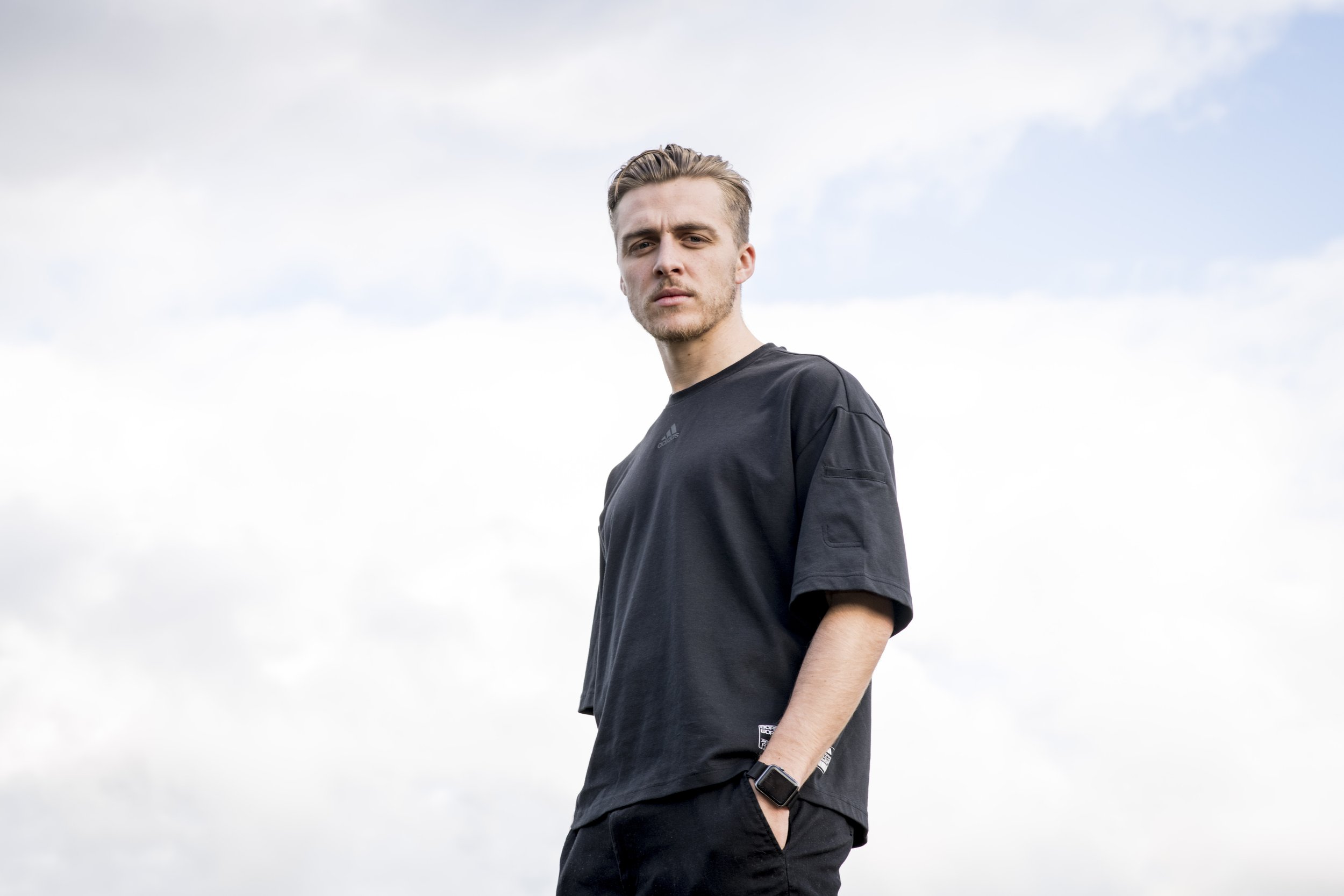Football is. Luc Jeggo
Imagine for a moment that you’re a young kid, born in Austria to English parents and at the age of eight you find your family immigrating halfway across the world to Australia. Add to that, the fact that your older brother will become a future Socceroo and that during your formative years playing football would influence every decision you make as a young adult.
This is the story of Luc Jeggo
Luc’s football journey is as much about self belief as it is about seeking and achieving success in a sport that you love. Luc’s self belief would be the driving force for him to explore opportunities abroad while the pursuit of his dream would allow him to carve out his own place in the world away
“The way I got into football was that my brother was starting to play. There was a lot of travel for my mum and she had to look after both of us, as dad was working a lot. So she said to the coach that if you want Jimmy to train and play (I think Jimmy was already kind of decent at that point), then you're going to have to take the younger one as well. So that was how I first started. From that point for the next 20 years it was just football really.”
Soon after arriving in Melbourne, Jimmy and Luc joined Green Gully while trying to adjust to a different lifestyle and culture. Luc perfectly sums up the impact of this period “I think sport is one of the best things you can have when you migrate to a new country because it's so easy to make friends through sport. Even though you're in a foreign place you've got something that feels like home. We ended up settling on Green Gully. It felt like it was a good club. It's a terrific club. So then I spent pretty much my whole junior career there. Then I went to Brimbank for a year or two.”
Football is. How much of an influence did Jimmy have in how you were thinking about football and your own pathway?
LJ: It's a weird one. It's never been a competitive thing with me and my brother. We never competed but there was definitely a sense that he was always doing well. It was actually a really interesting way for me to benchmark against what I was doing. I was okay if I'm doing similar to what he's doing, and I can see that he's for example in the VIS (Victorian Institute of Sport) and when he was at Green Gully and doing well and then when he went from the VIS to Melbourne Victory. So, I used him as a benchmark to follow his steps and work my way up. I was really lucky having him as a role model because he has always been very mature for his age, so I stayed away from doing stupid stuff because I knew he wasn't doing it. So I think he was super instrumental in the way I approached things. Even just having someone to play with consistently. You can never underestimate the importance of your environment from that point of view as well.
Melbourne Victory | the journey starts
After impressing in Gully’s junior system, Luc made his way to the Victorian Institute of Sport (VIS) on a half scholarship and later join the Melbourne Victory Youth team through the NTC (National Training Centre run by Football Victoria and Football Australia).
Following a similar path in life to your siblings is not that unusual - especially considering the level of upheaval that can occur when relocating to a new country at such a young age.
Luc joined Victory when the club was packed with stars and Ange Postecoglou was the manager. It was during the golden period for the club so it was understandably quite difficult for players in the Youth system to break through to the senior squad.
Football is. What were the things that you learned about yourself being at Victory that assisted you later in your career?
LJ: When I came through Victory we had an incredible first team, I mean I had in front of me the likes of Billy Celeski and Mark Milligan. Leigh Broxham who people don't understand how good a footballer Broxy is. You don't stay at one of the biggest clubs for that amount of time if you are not up to it and then when you have a manager like Ange (Postacoglou) who's ruthless. Ange came in pretty much and gutted the whole team and he kept Broxy. There's a reason for that. So on top of that my brother Jimmy was in the squad. So, I struggled to breakthrough at that point which was tough. But I learned so much. I got to play with Archie Thompson as well. There were so many good players in the group and some really strong characters like Adrian Leijer and Broxy. They just set unbelievable standards.
The one thing I’ve noticed is that the best coaches and clubs all have incredibly high standards. The standard of what they do at training, expecting everyone to be on time and doing all the right preparation. So that was the kind of thing that rubbed off on me being at Victory. And then on a personal level...I struggled in the first year at Victory almost with a form of performance anxiety at training. When I first started training with the senior team (I laugh about it now) but I'd go through these periods where I'd feel like I couldn't juggle properly. I'd be in the first team and feel that pressure. But, if you took me on the street I could juggle all day long. But when you had the pressure of coaches and stuff it fell away. In time I learned how to deal with that and I think that was a big part of that first year. It's probably something that, in the end I don't really know why I didn't make it. But that ability to handle pressure may have been something they thought about. And I think that tag was probably hard to get off my back at that point. I guess it was all part of growing up as a player and as a person.
At that age Football was everything. To be at Olympic Park and training at Victory who were my childhood club was incredible. I can remember the atmosphere at Olympic Park, people don't understand how good the A-League was. It was hard to separate the fan in me from the player because it was such a big part of me and it was so important for me to be training with the first team. It was definitely a learning curve on how to deal with that and the pressure you put on yourself as a player, as a person.
Football is. How long were you captain of the youth team?
LJ: I was captain for two years. That was when I really matured and was doing quite well. I always enjoyed having leadership roles, it felt natural doing that.
Football is. That was one of the things I was wondering. Do you think that having that responsibility on the pitch and off the pitch prepares you for life outside of football when you get older and need to take on a different mindset?
LJ: I don't know if being a leader changes you, or whether the way you are makes you a leader. To be honest, there's a part of me that was in the gym early because you want to impress and you want to be seen as professional, but for the most part i just wanted to make sure I ticked the box in terms of preparing properly. I think that was one of the big reasons why I became Captain. I guess there's certain things where there's a responsibility to act differently, but at the same time I shouldn't act differently whether I'm a captain or not, it is an importance role, but if you're putting too much importance on it, and you're changing your behaviour then you aren’t being true to yourself and your values.
Football is. What were the circumstances around finishing at Victory?
LJ: That was probably the hardest setback I think I've had in football, or maybe the second hardest. I'd done well, I'd won Player of the Year. I was quite close to playing in the first team at one point, and I literally had a two week spell that I could have played and I got injured, which is just sod's law. Everyone's got that story in football. I guess the thing that killed me was we had these three Youth spots. They were almost free contracts that the FFA (Football Federation Australia) gave you money for. And they decided to fill those spots with all AIS (Australian Institute of Sports) players, and if I'm completely honest that was what probably killed me. That meant there was no room for me to go and get a contract from there. But you know they made the judgement and that maybe those players were better, it’s just opinions but that's football. I found it hard being the Captain and having won player of the year. I didn't know how many more boxes I had to tick. But that was it and then I found out that I wasn't in the ACL (Asian Champions League) squad and that was when I wanted to move on.
There is always a part of me that wonders if I should have left earlier. I was always thinking about going to England (I have an English passport) and joining an academy. I think it’s something players should think about more now because the A-League is not producing the same quality of players as those overseas who play at the top level.
I tend to not focus too much on the past, but if I'm sitting here doing this kind of looking back, then I do wonder what would have happened if I'd gone over earlier. I know that when I went over so many of the clubs I went to were good clubs but I thought, the level isn’t that big a jump. On top of that, if you weren’t to make it at 18, there are far more opportunities for full-time first team football. In the A-League, they get a first team contract, or go back into part-time football and I think that’s a big reason why we struggle to produce players due to the limited opportunities.
After I was released by Victory I couldn’t get a trial with any A-League clubs so I decided to go to the NPL for six months and then my plan was to go overseas. After ten games I completely obliterated my knee and tore my ACL, lateral ligament and my hamstring tendon off the bone. That meant that suddenly I was without a contract and had no money coming in. It was a really rough time.
Football is. How did you manage your rehab during this period?
LJ: Victory were incredible. Even though I’d already left the club they got me into the best doctors and surgeons. Darren Davies the youth coach and the Victory physios, Travis Maud and Ryan Florence-Rienets were amazing. It was pretty much sealed that I was leaving, but they did right by me and kept treating me at the club, mostly coming in early to treat me before the other boys arrived and giving me full access to the facilities. Aaron D’antino went out of his way as well to introduce me to the analysis side of things to keep me going, which also helped a lot. When I think of Victory at it’s best, that’s what it's all about.
Football is. Did you ever think about giving everything up during this period?
LJ: I don’t think I thought about it, even though at that point it felt like it was more than just a setback. That feeling of Oh Fuck! This sets everything back a year. I got into the rehab. I was at a point that I couldn't enjoy myself knowing that I still had a lot left. That was my main thing. Every time I thought about whether I should keep going, it was like, I've seen the level at Victory. I can play at that level with those players. I know that. I could keep going. And so that was what drove me. So it was hard, but looking back. I think it was a pretty empowering period.
So I was doing my own rehab with little money behind me because in the NYL (National Youth League) you didn’t get great wages so I ended up working at a call centre to save enough money so I could go overseas. During this period I became more determined that I'm gonna go and give this a crack overseas. I was going to train at Gosch's Paddock at about five or six am, train for two hours to 8am and then go straight to work and then go home or go to gym after work.
I often think about how symbolic and weird it was to train at Gosch's Paddock (Victory’s training ground). One minute I was at Victory and then I'm standing there at 7am and I've got to go to a call centre in an hour. But in a weird way I really enjoyed that, me grinding and that's been something that’s driven me my whole career. The thing I've enjoyed most was focusing on my goal to go overseas and get myself a professional contract. That drove me and got me through everything.
Life abroad in and out of Football
Football is. When you took off to go overseas How much of an advanced plan did you have?
LJ: If anyone knows me I'm very bad at leaving things to chance. I'm a bit of a control freak. So, before I went, I messaged every person on Facebook I thought that could know someone overseas. I went through all my contacts and said look I'm going overseas. Is there anyone you know who can help me get my foot in the door. I was like I don't need a hotel, I don't need anything, just get me a training kit and I'll get there and get myself on the football pitch, and try and get myself in front of people. So I was really lucky I had some close family friends who live in Hungary, and they helped me out a lot. They let me stay with them and also knew some people in the football world in Hungary. So then I started trialling through clubs there but didn’t really crack it. Now I look back. You don't know at the time but I was trying to sign as a foreign player at 21 with no senior experience, and they've only got six foreign spots and can pick from the whole world. Its extremely improbable but those are the things you learn as you go through it. So then I went to England, and was close to signing with a conference team there, which was fifth division but even then the standard was really professional; it was hard football. The football was brutal, but it's good. Money wise that didn't work for them. And then out of the blue. I'd spoken to Brent McGrath who knew two Danish agents. They just called me and we're like, there's this club in Norway in the third level. They've seen your video and they're super interested. Do you want to go do it and I was like, Okay, send me the name, Floro SK. I can Google anything. I'm good at googling but there was nothing there except two videos on YouTube of the ground and everything. It was a town of 10,000 people. The agents were like you know they're gonna fly you over and the worst could be that you just get a trip to Norway, so I said yes. And then as soon as I got there I was like there's no chance I'm not staying. It was proper football again, it was how I felt at Victory. It was a big contrast to the NPL at the time because you're training two, three days a week and there was a lack of professionalism back then, which is different now. So I just loved it. And then it was kind of a whirlwind from there.
Football is. What is your greatest memory from that period overseas?
LJ: So much happened it's hard to put it all into one now, in terms of the best memories. I had two promotion seasons where we got promoted. I know there's all the stuff about promotion/relegation in Australia and whether it's viable financially. I get that. I'm just saying, promotions and relegations just add something completely different to football and were easily the most memorable part of playing in Europe. I also got to play at some big clubs, with good fans, players and history. It was the stuff you think about as a kid.
Football is. So when you joined Floro SK, did you even have any idea on the trajectory that they could be on?
LJ: So the way it started was that Floro were in the fourth tier and the coach Terje Rognso came in and got rid of all the old guys and brought in eight or nine 15 year olds, and just played them. And these guys played for three, four years together, and even longer and got the team promoted to when I joined. So the team was newly promoted, from a small town and had local players meaning we flew under the radar.
And so when I joined we had boys who had played 300-400 senior games together, but no one really knew, what was going on and then I got there and saw the quality of some of these players and I thought holy shit we’ve got quite a squad. Considering it was such a small place and I obviously didn't know anything about the league I still had a feeling we had something special. And then we started on a run about halfway through the season. We won 11 games in a row. It became a massive thing because the club hadn’t been in the second tier for I don't know how long. It was probably 30 years.
It was a funny story, because it was so unbelievable we joked to the coach that if we get promoted then you've got to send us to Vegas. And he was joking and then one day he eventually muttered Yes, and we were all like, we're going to Vegas type of thing after every game as banter and that kept building up. So then we were about to play the second last game and if we won that it was like first versus second. If we won that game then we were promoted. And so he comes into the change rooms and he's like okay, no one can speak to the media or anything because we don't want to put pressure on ourselves. It's a huge game. Then our striker who is a great player, a crazy guy but a good guy. He spoke to one of the journalists. He wasn’t really thinking. They were just having a conversation, it wasn't an interview, and told him about the Vegas stuff. So when we wake up the next day and the front page of this small town newspaper there is a headline ‘IF THEY WIN, THEY’RE GOING TO VEGAS’. So, the coach come in and puts the paper on the table and says 'for fuck sake. I told you to not say anything, You had one thing to do.’ So then we got to the ground and the supporters brought Las Vegas banners and stuff like that. So we ended up winning the game and all the sponsors came in and sent us to Vegas. So winning the league and then we went to Vegas all together. That was just an unbelievable experience.
Football is. How many years were you there?
LJ: Three years in Floro. I'd had three really strong years. I'd cemented myself playing in the second tier and was comfortable. I was up to nearly 50 games. My goal when I came there was to sign my first professional contract, I did that. And again, I think I enjoyed it for, you know, a minute. So then I rolled the dice. I really wanted to go and play in England. That's always been a draw card for me. So then I said to the club that I'm going to go free agent and just try and see what I can get, and then during that time I was trialling at different clubs. I was close to signing in Scotland. I had a really good trial at a Scottish top division club. They told me they were pretty much thinking about signing me. I had one game and I fucked the game up which is football. It was hard because it felt like being back at Victory again and struggling with the performance anxiety stuff. It was a stage in my career that I thought I'd matured on and it came back to bite me. That made it a tougher pill to swallow.
When you're trialling the margins are so thin. Then because of that l ended up cutting it very fine. I missed the January transfer window in England, so then I could only sign in Scandinavia as their transfer window was still open. So then I managed to get a club who was very well established in the second tier and knew me quite well, I'd played against them multiple times. They took me to Spain for a training camp and this was the last week of the transfer window in Norway. They needed a midfielder and I was like, great, because they were a good club, knew me and it seemed fairly set. They were looking to get promoted.
In terms of looking back the goal for me was to get a professional contract in the second tier and then I wanted to play in the first tier in Europe. I know I'd never be satisfied but that was one of my goals at that time. So then I went with them to a training camp. They had a 17 year old who just turned it on. He'd been injured for a few years and they weren't sure, but in the end they didn't want to block his development with my signing. Now looking back he had a super year. He won player of the year last year and he's going to go onto big things. On literally the last day before they were flying back. I just thought they were going to take me back with them and they were like. “No, we're not, we're not gonna sign you on” This was pretty much the last day of the transfer window in Norway. That was probably one of the hardest points because then I knew that I'm in trouble. You also sit there wondering about everything because you've mapped out what makes sense to you. For me, I'd played at that level, so I assumed that I'd train well and it would be done. You start questioning your ability, you feel like you've trained well but wonder if you've misjudged things, whether they see something you don't, whether maybe you just think you are better than you actually are. It’s always a tough moment and I think it’s a feeling a lot of footballers can relate to.
In the end, That was how I ended up in the Faroe Islands because it was the last day of the window. I'd rolled the dice and ended up losing that one. I ended up signing with TB Tvovoryri in the Faroe Islands, which was an amazing experience. The people they're just incredible people. The Faroe Islands would set me up for a new path. The main thing I learnt there was to try and not judge things as good or bad because you don't actually know until way down the line.’
With a lot of spare time when in the Faroe Islands, I discovered that Twitter for football analysis is a goldmine of content. It's just got some unbelievable stuff on there. So I was trying to look at the games and trying to strategise why things didn't happen and I found that you can use tactical analysis as well as analytics/statistics to help to figure out what's going on in the game. So, I became really interested and fascinated in that and that kind of fed into the blog, Total Football Analysis and Between the posts.
Eventually after blogging for around 12 months, I saw a job advert for Mrkt Insights. They were a football analytics company who had worked with Swansea the year before. I thought I'd give it a try and was fortunate to land a job with them as a football analytics consultant. The guys are amazing and I learnt a lot. I was surprised how much I enjoyed working with data. I was speaking to some amazing people and getting feedback that what I was doing was good work. I started having this thought..is my potential still in football?, am I sacrificing all these other things I could be doing outside of football just to stay in the game. And if I had these other potential things that I could be pursuing, is it worth that sacrifice? That kind of grew more and more throughout the year. In the end 2020 was somewhat tough because I didn’t end up playing much. It was really hard for me because it felt like it was at the same level as when I joined when I was 21. It was a really tough thing to accept because I always looked at players when I was 21 and thought there's no way I wouldn't improve in five, six years so I must be playing at a better level in five or six years. I thought that the world was like that.
Sliding Doors | The Journey Home
LJ: As Luc started to apply for jobs back in Melbourne he would receive one of those once in a lifetime opportunities that would challenge his decision to return home.
I was undecided about whether to keep pursuing football or to pursue full-time work in the area of data analytics. So I decided to look into both options, applying for jobs whilst also assessing my options within Europe. Then an unbelievable opportunity to stay in Europe with a club came up. It’s funny how it works, it was the exact opportunity that if it was a one or two years earlier I would have jumped at it.
So I had this opportunity and then I was applying for jobs. And then I put in my head the type of companies that I wanted to join and PwC (Price Waterhouse Coopers) was right at the top. For me they were the 'A' game of coming back and doing analytics and consulting. My boss wanted to have a chat with me because he thought I had an interesting CV with sports analytics on my resume, but I definitely wasn’t a typical hire for the firm. He pretty much offered me the job on the spot. And so then I remember just sitting there thinking oh my god what am I gonna do because I have this amazing opportunity and trial in Europe. And then I have this as well, and I knew that I could come back and still play NPL and just kind of start enjoying life and football again and maybe something would happen in the A-League or whatever. It was more just those two things. I think it showed me how much potential I have to do other things. And then I made the really hard decision to come home and what felt somewhat to me if I'm honest, was giving up on my football career that I tried to chase for a long time. It was a bittersweet moment. From one point of view it was exciting to start a new chapter, but it also felt like I hadn’t really achieved what I set out to do.
At the time of leaving Norway, Luc had not been offered the role at PwC but made the decision to leave based on gut feeling. The interview experience was so positive that it strengthened his resolve to return and have something outside of football.
Prior to leaving Norway he put plans in motion that would see him reunite with his childhood club Green Gully. Luc knew that he wasn’t completely done with football and was confident that he would at the very least be able to secure a position with an NPL club he would be happy with.
Stevie Laurie, the Assistant Coach at Green Gully reached out to me probably every year. He'd send me a message asking what are you doing? So, I just sent Stevie a message. That was why I signed with Green Gully. I just had such a good feeling with the people at the club like Downsey, Ray and Stevie. They've done so much to help my transition back in Melbourne. Stevie was driving me around to different houses and different apartments and well in the end I decided to sign with them.
A big part of my decision was the fact that Gully were my childhood club but mainly that I looked at the squad and thought we were good enough to win the league. I spoke to a lot of people, I mean, a lot of coaches in the NPL, players and everyone was of the opinion that they can do well this year. They've got a good squad.
Football is. What was the first thing you noticed when you first walked in at Gully?
LJ: The change rooms, they changed them which was quite nice. I noticed that Jonesy (Daniel Jones) was still there. I had a chuckle to myself. I remember thinking that I probably wasn’t the best teammate last time I was at Gully but he was always such a good team-mate to be around and this time round I wanted to be a part of that and contribute to the atmosphere we’ve got at the club.
I had a really good team atmosphere last year as well in Norway. So, I understand how good it is to be in. It just makes everything better, which has almost made it puzzling for us this year not doing well because you definitely don’t look around and be like, this is because we've got dickheads. It's not. Because we've got good people across the board.
The flow state Living in the Moment
Spending significant time away from family and friends will often teach you a lot about yourself. Luc spent five years in Europe. Five years is a significant amount of time for you to change, for the people around you to change, for the world around you to change. Reflecting back on a lifetime is not something you normally do when you are yet to reach the age of 30. Ultimately when one aspect of your life has its origins at a very young age you will hit a cross road at the most unexpected of times. It’s not too dissimilar to being a musician who had a hit record and then spends a lifetime trying to better that experience. I asked Luc to think back to some of the key moments in his early career and more recently while abroad when answering the next question.
Football is. How do you live more in the moment?
LJ: When I was at Victory, we played Liverpool at the MCG in front of 90,000 and I was on the bench. I played every pre-season game at Victory and I'd been told that I was going to come on around the 60th minute. I remember warming up and I'm like, Oh my god!, I'm gonna make my debut in front of 90,000 in my hometown against Liverpool. This is surreal, the 70th minute comes nothing, 80th minute comes, 90th minute nothing. We did a lap of the ground. And I actually can't physically remember the experience. I just remember looking down at my feet and just being broken and devastated pretty much. I was shattered and it felt like the end of the world at the time.
When I think back I missed this amazing moment. I was 19. It was something that I worked really hard for and because I was so upset about not playing I didn’t actually get to savour the moment because I was so wrapped up in my thoughts and the pressures I put on myself.
When I look back on my career. I've struggled to actually enjoy any of the best moments I've had. I was always thinking about what I'm doing next year? Even when we got promoted I had that moment where I enjoyed it for a split second.
I remember playing at Start stadium in Norway in front of 12,000 people, when it was packed the atmosphere was electric. I remember it being one of my goals to play in that stadium and thinking, Oh my god!, next year when we get there I'll be so happy. Then you finally get there and you play the game and you are thinking about the next game or trying to impress. This takes you out of the present which makes it hard to enjoy the moment. For me now, it’s a constant process to try and refocus myself to learn to enjoy the process of doing what I am doing now and see where it takes me. Yes, you need to have a long term plan, but it's just getting that balance between enjoying what you have now and striving for something in the future and the sacrifices that come with that.
I always had this plan that by the age of 26/27 years old I wanted to be playing in the top tier in Europe. That was very much my goal. Prior to that point being overseas made sense. To sacrifice everything possible around it for that one goal because it meant so much to me. After the Faroe Islands I realised that I'm probably not going to reach the heights I have set for myself. So it was tough. I was questioning whether it was still worth being away from all my friends and family, not being able to enjoy my life.
So now I'm trying to recapture the attitude you have as a kid where it's more about enjoying the moments as they happen. Which takes a bit of practice. It's not an easy place to get to. I think that's one of the biggest learning curves, I took from being in Europe and doing that journey.
Football is. What has been one of the most obvious changes that have happened since you returning to Melbourne, whether it's in yourself or the people around you?
LJ: I just try to enjoy what I'm doing, and enjoy the pursuit of getting better at things, rather than being solely focused on the outcome like I did when I was younger.
I think I'm just constantly seeking improvement in whatever it is that I'm doing and I'm learning to deal with setbacks and not being bitter and resentful about things. I think I've been quite good with that. There's a million players who would think about all the what if’s and I'm the same. I think I could have played at this level or that level. I don't know if that's true or not, but you know that's one thing I'm been proud of; That I have not made excuses and tried to attach blame or even meaning, I’ve tried to take a more accepting attitude to the outcomes in the past .
In a sense, when I went to Europe I didn't achieve what I wanted to completely, there is still a large feeling of failure about it if I'm totally honest with myself and that has taken a bit of time to get to grips with. I'm proud that we went and got promoted twice and those are amazing memories. And so, I ticked the first two boxes which were to get a professional contract. I did that. Then to get a professional contract, playing in the second tier and then I was going for the first tier, But yeah I guess now it's more just trying to just be appreciative of the journey and the experiences you have rather than having to measure every outcome, and say oh this is a success or not. And I think I'm coming to that point in my life where I'm now trying to accept things for the way they are.
I think I've got more balance now in my life as opposed to when I was solely focused on football. Balance for me is not about going out or partying all the time and missing out on that. It’s more the time with family, friends and also having the ability to follow your curiosity wherever that may take you. For me at the moment I felt as though I wanted to pursue my potential off the pitch and away from football, but also keep playing at a good level which could maybe lead to something. So in that way, coming home to Melbourne allowed me to achieve that balance more.
So for me its about getting that balance in your life and doing the things that you enjoy as much as possible. That's my measure, if something came along unexpectedly, I'm in a good place where I'm okay now. My identity isn’t as tied to being a footballer as it was before. I think that has been the hardest part for me coming home. If i'm not Luc the football player, then who am i? I can understand now how so many players struggle at the end of a career or with a career change.
If you think about it in the context of football the games that you play the best are those games where you're not thinking, you're just in a flow state and playing completely free of conscious thought. So especially now being back. I've tried to be more in those states more often because I think it makes my life more enjoyable.
I think COVID helps you see how important it is to be around people. Like coming in to training yesterday, you were there. After being stuck alone for two weeks living on my own in an apartment. And then just being able to be at training with the guys and banter and stuff. So you realise that Okay, now I should really enjoy being in the change room and not take it for granted because you can have a lockdown and then you know it's not on again. So learning to be grateful for those moments and all the little things that go on that you usually get wrapped up in your thoughts like I'm not going to do this I'm going to do that. I think that would be like, the main thing for me. It's really challenging and a constant battle, but I think a big part of learning and growing.
I'm 28 and I guess in time you learn those things and that's been my experience over time. I'm in a different place now than when I actually went to Europe. That person I was when I went to Europe is now completely different.



